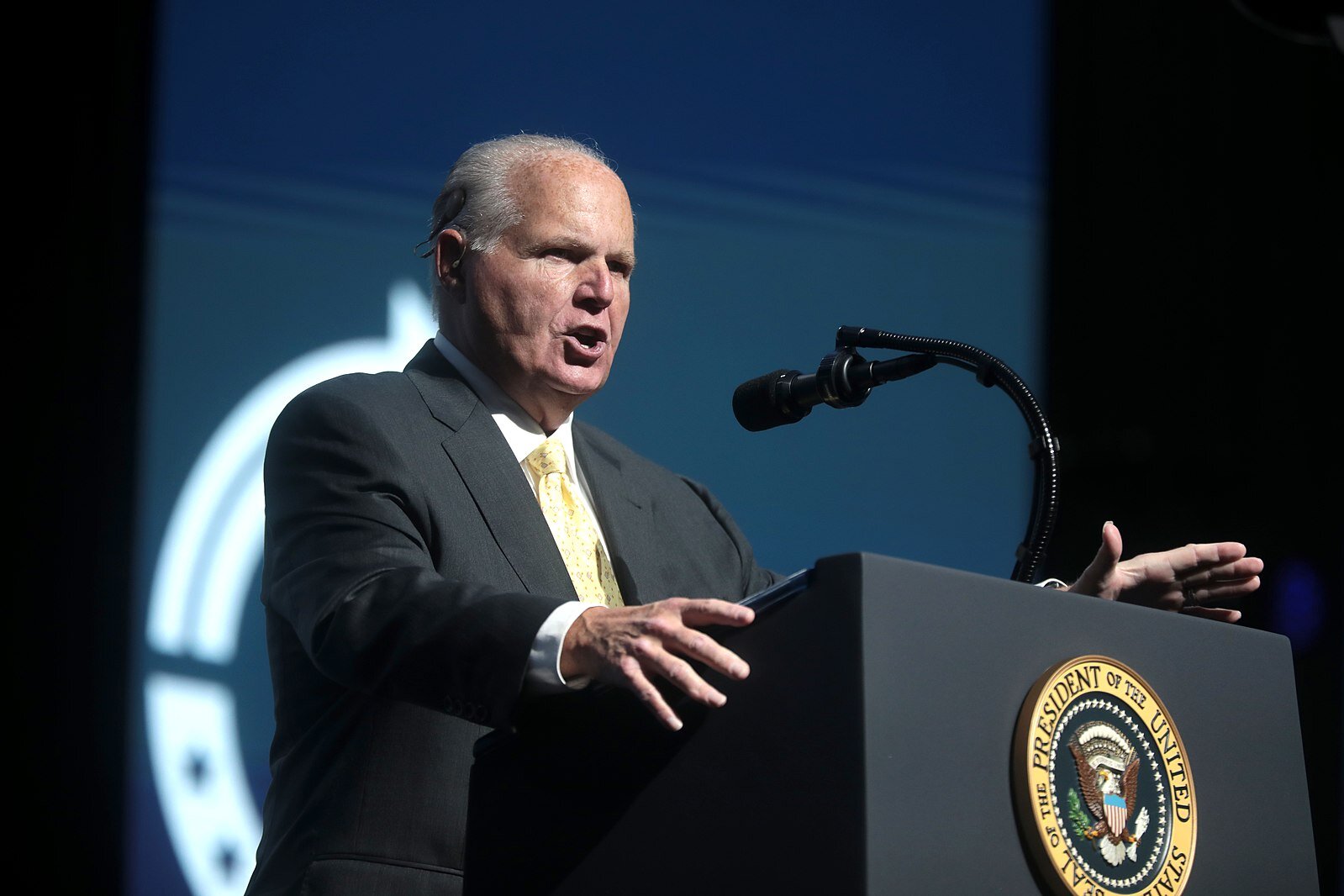
On Monday, June 21st, Hosts Buck Sexton and Clay Travis debuted a new national radio show that answered a momentous question for syndicator Premiere Radio: who would take over the time slot vacated by the man who made modern talk radio, Rush Limbaugh who died in February at age 70?
The debut of Sexton and Travis offers a good moment to think about what this transition will mean for talk radio more broadly. With that in mind, here are five predictions:
Sexton and Travis Won’t Come Close to Matching Limbaugh’s Stardom.
They almost announced as much on their first show. Travis pledged that they were going, “to be the voice for many people who do not feel like they have a right to share their voice.” The host expressed optimism that their show would “help to make — I really do believe this — the country a better, smarter place and maybe (just maybe) we’re gonna be able to, I believe, to win a lot of the battles that matter going forward.”
But this mission fundamentally misreads what made Limbaugh so successful for more than three decades. Limbaugh was a consummate radio entertainer who had honed his craft as a disc jockey. He told an early interviewer that people listened to the radio for three reasons, “entertainment, entertainment, entertainment,” and he always prioritized reaching through the radio and grabbing listeners.
No doubt, Limbaugh’s passing left a vacuum in the political talk radio space; however, Travis and Sexton won’t fill it because they are repeating the mistake of dozens of hosts – both liberal and conservative – who have flopped over the years. They see their job as political. Travis’s opening day pledge sounds eerily reminiscent of comedians Al Franken and Janeane Garofalo when they launched programs on the then-new liberal Air America network in 2004. For Franken, Air America’s mission was to take back the country from the right-wing, while Garofalo wanted to “give voice to the millions of Americans that are left out of national conversation.” Neither host had anywhere near the popularity or longevity of Limbaugh, because, unlike their entertainment work, they had political goals instead of focusing on putting on the most engaging show possible — and having fun.

Travis’s pledge isn’t surprising given Sexton’s background as one of many Limbaugh imitators who are more political and less entertaining than the man who blazed a path for them. But especially with conservative political commentary available in an increasing number of places, making politics a talk show’s top priority saps it of its uniqueness and doesn’t bode well for cutting through the clutter.
The Rise of Anti-Woke, Anti-PC Culture
To hear Clay Travis voice this mission statement was a bit ironic, however. Unlike Sexton, Travis comes from a new tradition of spoken word media, one far closer to Limbaugh’s origins than hosts like Sean Hannity, or Mark Levin. In his former career as a sports talk host, Travis gained popularity by letting conservative values orient his discussion of sports, becoming a harsh critic of “wokeness” and “cancel culture.”
Travis emblematized a new breed of hosts, like Dave Portnoy of Barstool Sports and podcaster Joe Rogan, who have become wildly popular with shows that exude a White male sensibility and cultural orientation. These are shows that decry “political correctness,” over-sensitivity, the purported spillover of politics into sports, entertainment, and day-to-day life — and often traffic in conservative tropes in the process.
As Limbaugh did in his early days, they have fun, but a distinctly white male version of fun. Unlike Limbaugh’s early days, however, the discussion on these programs is largely not focused on D.C. politics or policy debates. Portnoy and Rogan have both even disclaimed any particular political orientation, but they embody the conservatism populism that now defines Republican politics.
Why might this style of show be the future of conservative talk? In a word: demographics.
While conservative talk (on radio and cable news) attracts a notoriously old demographic, these less overtly political or ideological shows score far better with younger listeners, especially men. Given the liberal political leanings of voters under 50, these shows may be the future for commercially successful conservative talk, more driven by a cultural orientation and a rebellion against “political correctness” than a right-wing ideology.
The Fragmentation of Rush’s Audience

Limbaugh’s audience is almost certain to break up, getting spread among a number of hosts. While Premiere has chosen Travis and Sexton for Limbaugh’s 12-3 PM ET time slot, they will face far fiercer competition than talk radio’s king did as other syndicators try to capture some of Limbaugh’s audience.
Cumulus Media, a competitor, debuted political commentator Dan Bongino in the midday in May. A range of other nationally syndicated hosts, from Charlie Kirk to Dennis Prager to Dana Loesch to Erik Erickson, are also jousting for Limbaugh’s affiliates and listeners — with some success. In some cases, affiliates have opted for local programming to replace Limbaugh as well.
In short: the 12-3 PM slot will now look more like other day parts, in which a variety of nationally syndicated conservative shows battle it out for listeners.
The Next Big Hit in Talk Radio
One thing that enabled Limbaugh to rocket to superstardom in the late 1980s is that he produced a show unlike anything people had ever heard. Limbaugh rejected the staid interview and caller-oriented local programs that defined talk radio previously. Instead, Limbaugh’s zany show featured parodies, colorful nicknames, and the host’s perspective front and center. It was fresh and new. As the late Barry Farber, a New York star during the pre-Limbaugh talk radio era told me, when Limbaugh and his imitators came along, “All I could think of was why didn’t I think of that?”
Limbaugh attracted an audience that no one in the radio business knew existed. Subsequently, over more than a decade, shows like Limbaugh’s became the norm because radio executives are self-admittedly not a creative lot. They face far less risk in broadcasting a format that is successful elsewhere than trying something new.
But media superstars, from Limbaugh to Jon Stewart to Howard Stern, all create appointment listening or viewing by producing something fresh and unique. Their work redefines a medium and exposes a latent demand for something that hasn’t seemed essential previously. Hosts like Travis and Sexton aren’t likely to have that kind of effect.
The next big hit in spoken word programming, therefore, is going to be something very different. It could be an audio version of the popular talk TV show “The View,” targeted towards the oft-ignored female audience. It could be something that violates the norms for talk radio — say by blending sports and politics. It is entirely possible that something completely novel blazes a path.
By playing it safe, however, Premiere has virtually assured that Sexton and Travis won’t have anywhere near the impact that Limbaugh had during his 32 plus years behind the “golden EIB [Excellence in Broadcasting] microphone.”
Conservative Media Will (Collectively) Retain Its Hold on the GOP
Limbaugh had a massive and loyal audience that won’t be matched by anyone else. And, it was because of that fan base that people in Republican politics paid unique attention to Limbaugh and what he said. Conservative media will maintain its’ incredible hold on the GOP, but it will be more of a collective impact than any individual host stepping into this void.
Dr. Brian Rosenwald
Dr. Brian Rosenwald is a fellow and instructor at the University of Pennsylvania, Senior Editor of Made by History, and author of Talk Radio’s America: How an Industry Took Over a Political Party That Took Over the United States. He is a frequent commentator on radio, television, and in print, including pieces for The Atlantic, The Washington Post, CNN, Politico, and has contributed to pieces for media outlets including The Wall Street Journal and The New York Times.







